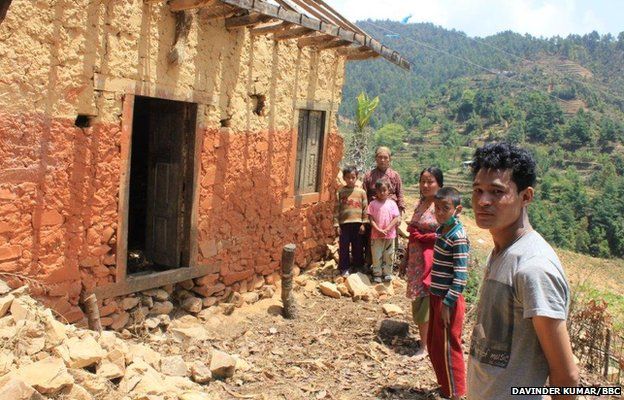Nepal earthquake: The remote communities still waiting for help
- Published

Buddhimaya is still desperately waiting for help, a week after Nepal's earthquake reduced most of her home to rubble.
Her family of 15, including six grandchildren, are living in a tent with their neighbours. After being soaked in rain water for days, the tent is filled with the stench of the damp fabric and bedding.
Buddhimaya's options are fast running out. The 55-five-year-old has no roof over her head and her meagre savings are dwindling.
"We have not received any help whatsoever so far. We have no shelter and we will run out of food any time now," she says. Buddhimaya's family, like most in her community, are subsistence farmers and rely on daily wages for survival.
Last Saturday's 7.8-magnitude earthquake devastated the tiny hilltop village of Fakhel, home to indigenous Tamang people, where Buddhimaya and hundreds of others are waiting for help.
Close to 800 houses built in traditional style with stones and clay plaster have either been destroyed or rendered unsafe to live in.
Nestled deep in the Himalayan hills, 40km south of Kathmandu, most of Fakhel's communities are only accessible on foot and can take hours to reach. The earthquake has only increased its isolation.
'The end of our dream'
In almost every Tamang household, young boys leave home for Kathmandu and other cities to support their families. Buddhimaya's sons were working as waiters in the capital, but the earthquake has cost them their accommodation and jobs.
"I am worried that we will not have food to eat very soon. This earthquake has destroyed our lives," says Buddhimaya's 26-year-old son Madan, himself a father of two.
Almost every indigenous family in Fakhel has been affected. Among Nepal's poorest and most marginalised people, the Tamang are living through the consequences of this tragedy with an overwhelming sense of helplessness.
Sano Kanchi cries uncontrollably as she looks at the huge cracks on the wall of her house, which is no longer safe. Sano, 42, and husband Thulo had always dreamt of owning a modern home and 10 years ago spent all their life savings to build one.
"We have lost the house and are now left with a huge mortgage to pay," she says. "This is the end of our dream."
Sano's family are now living in a tent several other families. They are cutting down their food intake, unsure of how long it is going to last. Children in the community have been deeply affected by the earthquake.
"I have come across children who cry when their parents venture inside damaged homes. Some can't sleep or eat properly," says Dhananjaya Pokharel, who runs a primary health clinic in the village.
"Cases of diarrhoea and fever are also rising among children living in tents," he says.
'No-one cares for us'
Almost every hill in Fakhel is dotted with ruined homes. Families with young children can be seen huddled up together in ramshackle tents, closer to running out of food with each passing day.
"No one cares for us. We only want some food and temporary shelter so my people can survive this tragedy," says the community's 86-year-old chief, Sano Kancha.
The Nepalese earthquake has left hundreds of thousands devastated in its wake.
As concern grows over the pace of the relief operation, there are fears that the less visible communities will fall through the cracks.
But Buddhimaya and her family are keeping faith. Homeless and hungry, they are holding on to their hopes that aid will reach them soon. "Each time I see a lorry far away, I think someone has come to help us," she says.
Davinder Kumar is the global media manager for humanitarian organisation Plan International.